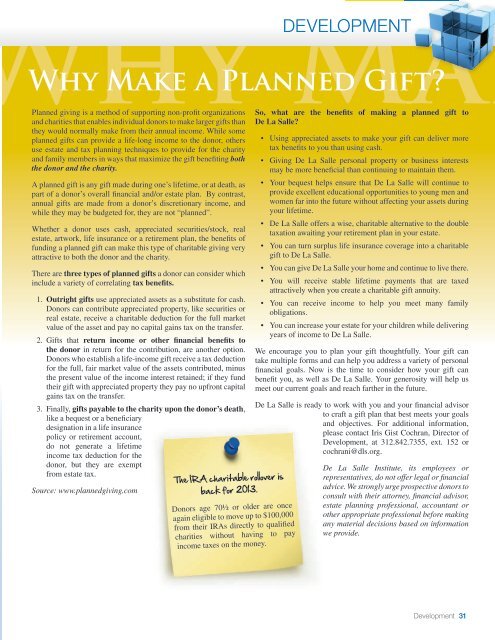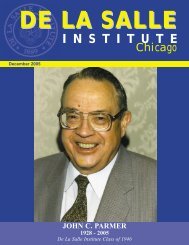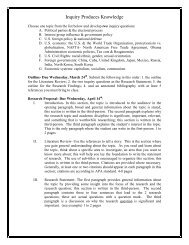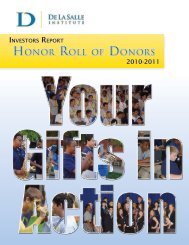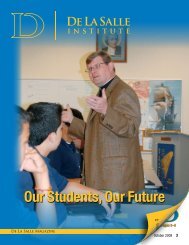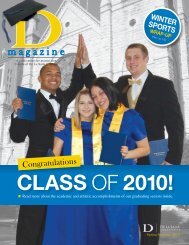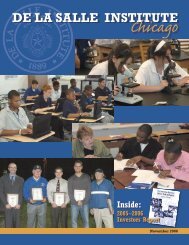John Potempa ‘65 –Giving Back to the MeteorsWINTER <strong>2013</strong>Wish ListAs you consider your annual gift thisyear, here are some ways your supportwill impact the current students at <strong>De</strong><strong>La</strong> <strong>Salle</strong>. Contributions at any levelare greatly appreciated because everydollar counts. Please use the enclosedenvelope to grant a wish, and indicatethe wish or wishes on the memo line ofyour check.• $56 will provide the monthlylease payment for one student touse a Tablet PC• $90 will enable a student to rentan instrument and learn how toplay• $150 will cover the cost of amonthly Metra train pass for onestudent to commute to <strong>De</strong> <strong>La</strong> <strong>Salle</strong>on the Rock Island train• $250 will help a student to attenda retreat at <strong>La</strong> <strong>Salle</strong> Manor inPlano, IL• $300 will cover the cost ofregistration fee for one incomingfreshman from the Class of 2017• $550 will help purchase fivecheerleading uniforms• $750 will provide for one theatreproduction• $1,000 will cover the full cost topurchase a Tablet PC• $5,000 will supply modernizedclassroom furniture• $9,450 will cover the cost oftuition for one studentEngaging young <strong>La</strong>sallians…priceless30 <strong>De</strong>velopmentOne of the hallmarks of <strong>De</strong> <strong>La</strong> <strong>Salle</strong> <strong>Institute</strong> hasalways been its accessibility to young people from alleconomic levels - especially underprivileged, workingclassfamilies. Today, <strong>De</strong> <strong>La</strong> <strong>Salle</strong> continues to attracta widely diverse student population. <strong>La</strong>rgely dueto the generosity of alumni and friends, <strong>De</strong> <strong>La</strong> <strong>Salle</strong>continues to meet the challenge of assisting studentsand their families with the financial demands of privateeducation. We recently had the opportunity to talk withJohn Potempa ’65, who shared with us how <strong>De</strong> <strong>La</strong><strong>Salle</strong> prepared the way for his future and why he and John Potempa ‘65his wife, Phyllis, give back to the <strong>Institute</strong>.Potempa willingly admits that <strong>De</strong> <strong>La</strong> <strong>Salle</strong> prepared him for all of life’sexperiences. He didn’t necessarily realize it during his four years at ‘D’, but hemaintains, “The best preparation for life that <strong>De</strong> <strong>La</strong> <strong>Salle</strong> afforded me was this:to SHOW UP and PERFORM. A diploma from <strong>De</strong> <strong>La</strong> <strong>Salle</strong> was earned, not justhanded out. This same formula has worked well for me over the past 50 years inthe US Air Force, business, academia and investment management.”A longtime member of <strong>De</strong> <strong>La</strong> <strong>Salle</strong>’s President’s Club, the school’s distinguisheddonor group, Potempa has been generously supporting his alma mater for nearlythree decades.“Giving back is simply the right thing to do,” he said.Both Potempa and his wife are products of the Catholic school system (St. Gall/St. Gabriel and St. Turibius/<strong>De</strong> <strong>La</strong> <strong>Salle</strong>).“We give back to <strong>De</strong> <strong>La</strong> <strong>Salle</strong> because it is our way of saying ‘Thank You’ to thenuns, brothers and fellow classmates who helped to shape our values,” Potempasaid. “We believe that education is an essential key to any person’s future andchoose to give back because we know it has a lasting impact.”The Potempas recently established the John and Phyllis G. Potempa EndowedScholarship, which is a permanent, perpetual source of income for <strong>De</strong> <strong>La</strong> <strong>Salle</strong>.The Potempas chose to establish the endowment because they know that theircontribution is being used wisely and want their charitable dollars to help thosewith the greatest need – deserving students attending <strong>De</strong> <strong>La</strong> <strong>Salle</strong>.“It also provides our daughters with an easy way to continue our charitablelegacy,” John Potempa said.The Potempas believe that education is a difference-maker and their investmentin <strong>De</strong> <strong>La</strong> <strong>Salle</strong> has significantly enhanced our work in fulfilling the <strong>La</strong>sallianmission of education.Giving back to <strong>De</strong> <strong>La</strong> <strong>Salle</strong> comes very easily to John and Phyllis. They believe theirendowed scholarship will help reduce the financial challenge for those wanting toattend <strong>De</strong> <strong>La</strong> <strong>Salle</strong>, but who might not otherwise be able to do so without financialsupport. The Potempas want their investment to enable students attending <strong>De</strong> <strong>La</strong><strong>Salle</strong> to graduate and be prepared for college and the world of work.“Hopefully, helping these young men and women will instill a spirit of giving ineach of them,” John Potempa said.<strong>De</strong> <strong>La</strong> <strong>Salle</strong> extends its heartfelt appreciation to John and Phyllis Potempa fortheir generous investment in our Meteors. You, too, can play a meaningful rolein the lives of the students attending <strong>De</strong> <strong>La</strong> <strong>Salle</strong>. Your financial support is veryimportant to our students and their families.
Planned giving is a method of supporting non-profit organizationsand charities that enables individual donors to make larger gifts thanthey would normally make from their annual income. While someplanned gifts can provide a life-long income to the donor, othersuse estate and tax planning techniques to provide for the charityand family members in ways that maximize the gift benefiting boththe donor and the charity.A planned gift is any gift made during one’s lifetime, or at death, aspart of a donor’s overall financial and/or estate plan. By contrast,annual gifts are made from a donor’s discretionary income, andwhile they may be budgeted for, they are not “planned”.Whether a donor uses cash, appreciated securities/stock, realestate, artwork, life insurance or a retirement plan, the benefits offunding a planned gift can make this type of charitable giving veryattractive to both the donor and the charity.There are three types of planned gifts a donor can consider whichinclude a variety of correlating tax benefits.1. Outright gifts use appreciated assets as a substitute for cash.Donors can contribute appreciated property, like securities orreal estate, receive a charitable deduction for the full marketvalue of the asset and pay no capital gains tax on the transfer.2. Gifts that return income or other financial benefits tothe donor in return for the contribution, are another option.Donors who establish a life-income gift receive a tax deductionfor the full, fair market value of the assets contributed, minusthe present value of the income interest retained; if they fundtheir gift with appreciated property they pay no upfront capitalgains tax on the transfer.3. Finally, gifts payable to the charity upon the donor’s death,like a bequest or a beneficiarydesignation in a life insurancepolicy or retirement account,do not generate a lifetimeincome tax deduction for thedonor, but they are exemptfrom estate tax.Source: www.plannedgiving.comDEVELOPMENTWhy Make a Planned Gift?The IRA charitable rollover isback for <strong>2013</strong>.Donors age 70½ or older are onceagain eligible to move up to $100,000from their IRAs directly to qualifiedcharities without having to payincome taxes on the money.So, what are the benefits of making a planned gift to<strong>De</strong> <strong>La</strong> <strong>Salle</strong>?• Using appreciated assets to make your gift can deliver moretax benefits to you than using cash.• Giving <strong>De</strong> <strong>La</strong> <strong>Salle</strong> personal property or business interestsmay be more beneficial than continuing to maintain them.• Your bequest helps ensure that <strong>De</strong> <strong>La</strong> <strong>Salle</strong> will continue toprovide excellent educational opportunities to young men andwomen far into the future without affecting your assets duringyour lifetime.• <strong>De</strong> <strong>La</strong> <strong>Salle</strong> offers a wise, charitable alternative to the doubletaxation awaiting your retirement plan in your estate.• You can turn surplus life insurance coverage into a charitablegift to <strong>De</strong> <strong>La</strong> <strong>Salle</strong>.• You can give <strong>De</strong> <strong>La</strong> <strong>Salle</strong> your home and continue to live there.• You will receive stable lifetime payments that are taxedattractively when you create a charitable gift annuity.• You can receive income to help you meet many familyobligations.• You can increase your estate for your children while deliveringyears of income to <strong>De</strong> <strong>La</strong> <strong>Salle</strong>.We encourage you to plan your gift thoughtfully. Your gift cantake multiple forms and can help you address a variety of personalfinancial goals. Now is the time to consider how your gift canbenefit you, as well as <strong>De</strong> <strong>La</strong> <strong>Salle</strong>. Your generosity will help usmeet our current goals and reach farther in the future.<strong>De</strong> <strong>La</strong> <strong>Salle</strong> is ready to work with you and your financial advisorto craft a gift plan that best meets your goalsand objectives. For additional information,please contact Iris Gist Cochran, Director of<strong>De</strong>velopment, at 312.842.7355, ext. 152 orcochrani@dls.org.<strong>De</strong> <strong>La</strong> <strong>Salle</strong> <strong>Institute</strong>, its employees orrepresentatives, do not offer legal or financialadvice. We strongly urge prospective donors toconsult with their attorney, financial advisor,estate planning professional, accountant orother appropriate professional before makingany material decisions based on informationwe provide.<strong>De</strong>velopment 31


